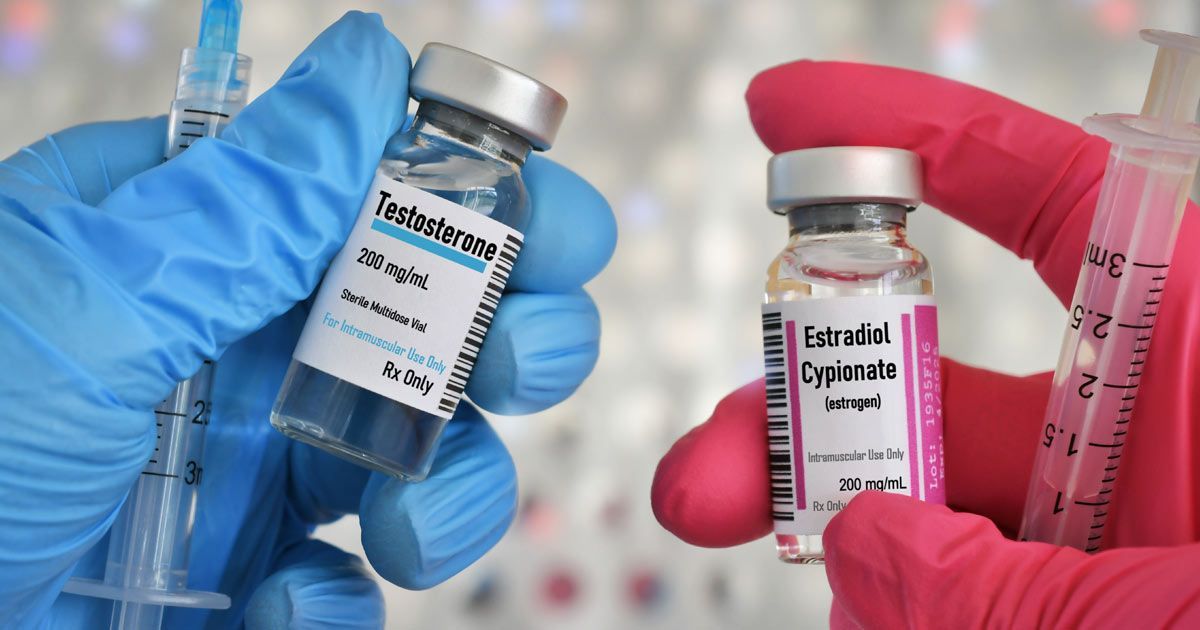Hormone Replacement Therapy NYC - Dr. John Salerno

HRT Treatments by Salerno Wellness in Manhattan, NY and Connecticut
Hello, I'm Dr. John Salerno. If you're experiencing symptoms like fatigue, mood swings, or unexplained weight changes, I want you to know that you're not alone. These challenges can deeply affect your quality of life, but I'm here to help you uncover and address their root cause. Using a blend of complementary, functional, and integrative medicine, including Hormone Replacement Therapy, I create tailored treatments to restore balance and help you feel your best.
-Dr. John Salerno
My approach to medicine is inspired by the belief that optimal health requires more than quick fixes or managing symptoms alone. Complementary, functional, and integrative medicine allows me to see the full picture of your health. I work to uncover the underlying imbalances that might be causing your symptoms. By combining traditional hormone therapy with cutting-edge natural treatments, I can create a customized plan that fits your individual needs. This holistic approach ensures that we address not just isolated symptoms but also improve your overall well-being. I aim to restore harmony in your body so you can regain energy, vitality, and a sense of control over your life.
Over 30 Years of Experience
With over 30 years of practicing medicine, I have helped thousands of patients achieve lasting results. My focus has always been on understanding my patients' unique health challenges, which is why I've dedicated my career to functional medicine. Whether it's hormonal imbalances or other chronic conditions, my methods are grounded in science and personalized care. Each treatment plan I create is designed with your unique needs in mind, combining proven therapies with innovative techniques. My years of experience allow me to see patterns others might miss and craft solutions others might overlook. You can trust that my team and I approach every patient with care, expertise, and dedication.
What Is Hormone Replacement Therapy (HRT)?
Hormone Replacement Therapy (HRT) is a treatment that addresses hormonal imbalances by supplementing your body with the essential hormones it's lacking. Hormones, the body's chemical messengers, affect nearly every function in your body, from energy levels to mood to digestion. When hormone levels decrease—whether due to aging, stress, or other factors—they can lead to disruptive symptoms that interfere with daily life. HRT restores these levels, creating balance and relieving symptoms. It's a highly individualized treatment; the type and dosage of hormones are customized to each patient. There are various forms of HRT, ranging from bioidentical hormones to traditional options. The goal is to correct deficiencies in hormones like estrogen, progesterone, or testosterone. By restoring balance, HRT improves not just isolated symptoms but your overall vitality.
HRT works by replenishing hormones your body is no longer producing naturally. During the treatment, synthetic or bioidentical hormones are introduced to restore balance. Bioidentical hormones, which are chemically identical to those produced by the body, are often a preferred choice for their natural compatibility. These hormones can be delivered in several forms, such as pills, creams, patches, or injections, depending on the specific needs of the patient. The treatment begins with thorough testing to understand your unique hormonal profile. Based on your test results, a personalized plan is created. Over time, as hormone levels stabilize, patients often notice a significant reduction in symptoms and improvements in their energy, mood, and quality of life. Ongoing monitoring ensures that the therapy remains effective and safe.
What Conditions Does HRT Treat?
Hormone Replacement Therapy can address a wide range of conditions, including:
- Menopause: Hormonal shifts during menopause can cause hot flashes, mood swings, and night sweats. HRT alleviates these symptoms and helps women transition more comfortably through this phase of life.
- Andropause: Declining testosterone levels in men, also known as andropause, may lead to low energy, reduced libido, and muscle loss. HRT restores testosterone levels to improve vitality.
- Thyroid Disorders: An underactive or overactive thyroid can disrupt metabolism and energy regulation. HRT stabilizes thyroid hormones to bring relief.
- Adrenal Fatigue: Chronic stress can deplete the adrenal glands, leading to fatigue and brain fog. HRT supports these systems and renews energy levels.
- Post-Hysterectomy Symptoms: Women who've had a hysterectomy often experience hormone imbalances due to changes in estrogen and progesterone. HRT provides symptom relief and balance.
- Bone Density Loss (Osteoporosis): Reduced hormone levels can weaken bones over time. HRT helps maintain bone strength and reduces fracture risk.
- Polycystic Ovary Syndrome (PCOS): Hormonal irregularities cause symptoms like weight gain and irregular cycles. HRT brings balance and relief.
Hormones That Make Up HRT and What They Do
Hormone Replacement Therapy (HRT) typically involves the use of estrogen, progesterone (or progestin), and sometimes testosterone, depending on the individual's needs. Estrogen is the primary hormone used in HRT, particularly for women experiencing menopause. It helps alleviate symptoms such as hot flashes, night sweats, and vaginal dryness, while also playing a role in maintaining bone density to prevent osteoporosis.
- Progesterone, or its synthetic form progestin, is often combined with estrogen for women who still have a uterus. Its primary function is to protect the uterine lining from overgrowth caused by estrogen, which can reduce the risk of endometrial cancer.
- Testosterone may also be included in HRT for both men and women to improve libido, energy levels, muscle mass, and mood.
In some cases, other hormones like DHEA, a precursor to estrogen and testosterone, or thyroid hormones for thyroid imbalances, may be part of the therapy. The specific combination and dosage of hormones are tailored to the individual's symptoms, medical history, and overall health, with regular monitoring to ensure safety and effectiveness.
The Difference Between HRT and BHRT
Hormone Replacement Therapy (HRT) and Bioidentical Hormone Replacement Therapy (BHRT) are both treatments designed to address hormonal imbalances, but they differ in the types of hormones used and how they are produced.
- Hormone Replacement Therapy (HRT) typically uses synthetic or animal-derived hormones, such as conjugated equine estrogens (derived from horse urine) or synthetic progestins. These hormones are not identical to the ones naturally produced by the human body but are effective in alleviating symptoms like hot flashes, night sweats, and bone loss. HRT is widely studied, regulated, and prescribed in standardized doses, making it a common choice for managing menopause and other hormonal conditions.
- Bioidentical Hormone Replacement Therapy (BHRT), on the other hand, uses hormones that are chemically identical to those produced by the human body. These hormones are often derived from plant sources, such as soy or yams, and are processed to match the molecular structure of human hormones. BHRT is considered a more "natural" alternative to traditional HRT, and it is sometimes customized for individuals through compounding pharmacies. BHRT may be better tolerated and have fewer side effects.
The key differences lie in the source and structure of the hormones, as well as the level of regulation. HRT is standardized and rigorously tested, while BHRT is often customized and less regulated, particularly when compounded. Both therapies have benefits and risks, and the choice between them should be made in consultation with Dr. John Salerno, based on individual needs and medical history.
Common Symptoms of People Who Need HRT
Individuals requiring HRT often experience a variety of symptoms. Fatigue is one of the most common complaints, leaving them feeling drained, no matter how much rest they get. Many also struggle with mood issues, including irritability, anxiety, or depression, caused by hormonal fluctuations. Sleep disturbances like insomnia or restless nights are another common issue. Unexplained weight gain, especially around the belly area, is often tied to hormonal shifts. Women may report hot flashes or night sweats, while men mention decreased libido and strength. Brain fog, difficulty concentrating, or forgetfulness are also frequent struggles. These symptoms often lead to frustration and an overall decline in quality of life. With the right intervention, patients can find relief and reclaim their lives.
Common Causes of People Who Need HRT
Hormonal imbalances can stem from various factors. Aging is a natural process, as hormone production slows down with time. Chronic stress can also wreak havoc on the body's hormonal system, particularly cortisol levels. Certain health conditions, such as thyroid disorders or PCOS, disrupt natural hormonal cycles. Lifestyle factors like poor diet, lack of exercise, or unsupportive sleep habits can further deplete hormone levels. Environmental toxins, found in plastics or processed foods, may interfere with hormone production. Hormonal changes due to surgery, like a hysterectomy, often lead to imbalances. Medications for other conditions sometimes disturb normal hormone functions. Genetics can also play a role, as some individuals may be predisposed to hormonal issues.

Ideal Candidates for HRT
The ideal candidate for hormone replacement therapy is someone experiencing substantial, quality-of-life-affecting symptoms linked to hormonal imbalance. Women entering or progressing through menopause are prime candidates for this treatment. Men suffering from age-related testosterone decline, or andropause, also benefit significantly. Patients with significant fatigue, mood swings, or decreased emotional motivation find great relief. Even those who face health issues like PCOS or hypothyroidism may qualify based on their specific needs.
Candidates are evaluated on their medical history and willingness to commit to the monitoring process. Those seeking a natural, bioidentical option often derive the most satisfaction from the results. Tailored solutions also benefit individuals navigating compounded challenges associated with aging.
Possible Side Effects
While HRT is safe for most, it's important to be aware of possible side effects. Some individuals may experience mild nausea or bloating when starting therapy. Tenderness in specific areas, such as the breasts, is another possible outcome. Others might see brief changes in mood as their body adjusts to the new hormone levels. Certain skin reactions, like redness or irritation, can occur when using hormone creams or patches. Weight fluctuations, though usually temporary, may be noticed. Some patients report mild headaches or dizziness, which often resolve quickly with adjustments. Rarely, more serious side effects may arise, but these are closely monitored through ongoing medical supervision. Regular check-ins ensure each patient's safety and well-being.
What Can Happen if Hormone Imbalances Are Not Treated
Hormone imbalances can significantly impact your overall health and well-being if left untreated. Hormones regulate many essential bodily functions, so an imbalance can lead to a variety of short-term and long-term health issues. Here are some potential consequences:
- Chronic Fatigue and Low Energy - Hormonal imbalances, such as low thyroid hormone (hypothyroidism) or adrenal insufficiency, can cause persistent fatigue and a lack of energy, making it difficult to perform daily activities.
- Weight Gain or Loss - Imbalances in hormones like insulin, cortisol, or thyroid hormones can lead to unexplained weight gain or loss, often accompanied by difficulty managing weight despite diet and exercise.
- Mood Disorders - Hormonal fluctuations can contribute to anxiety, depression, irritability, or mood swings. For example, imbalances in estrogen, progesterone, or serotonin can affect mental health.
- Reproductive Health Issues - Untreated hormone imbalances can lead to irregular menstrual cycles, infertility, or complications during pregnancy. In men, low testosterone can result in reduced libido, erectile dysfunction, or infertility.
- Bone Health Problems - Low levels of estrogen (in women) or testosterone (in men) can weaken bones over time, increasing the risk of osteoporosis and fractures.
- Heart Health Risks - Hormonal imbalances, such as high cortisol or low estrogen, can increase the risk of cardiovascular issues, including high blood pressure, high cholesterol, and heart disease.
- Metabolic Disorders - Imbalances in insulin or cortisol can lead to conditions like diabetes, metabolic syndrome, or insulin resistance, which can have long-term health implications.
- Sleep Disturbances - Hormones like melatonin, cortisol, and estrogen play a role in regulating sleep. Imbalances can lead to insomnia, poor sleep quality, or sleep apnea.
- Skin and Hair Changes - Hormonal imbalances can cause acne, hair thinning, excessive hair growth (hirsutism), or other skin conditions.
- Weakened Immune System - Chronic hormonal imbalances can suppress the immune system, making you more susceptible to infections and illnesses.
- Digestive Issues - Hormones like cortisol and serotonin influence gut health. Imbalances can lead to bloating, constipation, diarrhea, or irritable bowel syndrome (IBS).
- Chronic Conditions - Long-term untreated imbalances can contribute to the development of chronic conditions like polycystic ovary syndrome (PCOS), endometriosis, or thyroid disorders.
Addressing hormone imbalances early can prevent these complications and improve your quality of life. Treatment options may include lifestyle changes, dietary adjustments, stress management, medications, or hormone replacement therapy, depending on the underlying cause. If you suspect a hormone imbalance, please contact us for proper diagnosis and treatment.
HRT Case Study
Jane, a 52-year-old woman, presented with severe menopausal symptoms that were significantly affecting her quality of life. She reported experiencing frequent hot flashes, occurring five to six times daily, along with night sweats that disrupted her sleep. Additionally, she struggled with mood swings, irritability, vaginal dryness that caused discomfort during intimacy, and persistent fatigue accompanied by difficulty concentrating, often described as "brain fog." Jane had no significant medical history of cancer or cardiovascular disease, making her a suitable candidate for HRT.
After a thorough evaluation, Dr. Salerno diagnosed her with menopause-related estrogen deficiency. Blood tests confirmed low estrogen levels, and a bone density scan revealed early signs of osteopenia, indicating a need for proactive management to prevent further bone loss.
The treatment plan included a combination hormone replacement therapy regimen consisting of estrogen and progesterone in oral tablet form. This approach was chosen to alleviate her symptoms while protecting the uterine lining. Alongside HRT, Jane was advised to adopt lifestyle modifications, including engaging in regular physical activity with a focus on weight-bearing exercises to support bone health. She was also encouraged to follow a balanced diet rich in calcium and vitamin D and to incorporate stress management techniques such as yoga and mindfulness into her routine.
After six months of treatment, Jane experienced significant improvements. Her hot flashes reduced to one or two mild episodes per week, and her night sweats diminished, allowing her to enjoy restful sleep. Her mood stabilized, and she reported feeling less irritable and more focused. Vaginal dryness was resolved with the addition of topical estrogen, and her bone density remained stable, showing no further signs of deterioration. Overall, Jane expressed that she felt "like herself again" and was able to resume her social activities and hobbies with renewed energy and confidence.
Regular follow-ups were scheduled every six months to monitor her hormone levels, bone density, and overall health. Her healthcare provider discussed the possibility of tapering HRT after three to five years, depending on her symptom management and personal preferences, to minimize long-term risks.
This case demonstrates how HRT, when tailored to an individual's needs and combined with lifestyle changes, can effectively manage menopausal symptoms and improve overall well-being. It underscores the importance of personalized care and ongoing monitoring to ensure both safety and efficacy in hormone therapy.
Why Patients Choose Dr. John Salerno for HRT
Patients trust Dr. John Salerno for his unique blend of expertise and personalized care. With a wealth of experience, he delivers treatments that address not just symptoms but also incorporate long-term solutions. His holistic approach combines science-backed therapies with complementary strategies, reassuring patients they're getting the best treatments available. Dr. Salerno's warm demeanor nurtures trust and comfort throughout the healing process. Regular follow-ups ensure therapies remain effective and meet changing needs. He also emphasizes education, empowering patients to make informed decisions. By leveraging innovative techniques like bioidentical hormone therapies, his patients experience results that others did not provide.
Contact Dr. John Salerno For A Consultation on Hormone Replacement Therapy in NYC or Connecticut
Hormone Replacement Therapy offers a safe and effective way to address disruptive symptoms and restore balance to your life. With my experience in complementary, functional, and integrative medicine, I tailor each treatment plan to your unique needs. Together, we can uncover the root cause of your symptoms and create a path toward lasting wellness. Don't let hormonal imbalances continue to limit your health and happiness. Take the first step toward feeling your best by reaching out for a consultation. Contact my office today to schedule an appointment and discover how personalized hormone therapy can help you regain control of your health.
Please contact us today.
Additional References
- Hormone Replacement Therapy - Medline Plus
- Hormone Replacement Therapy - U.S. Department of Veterans Affairs



